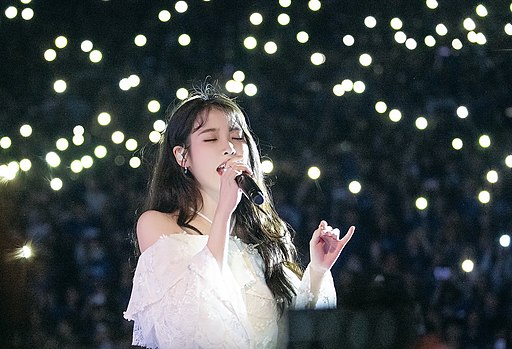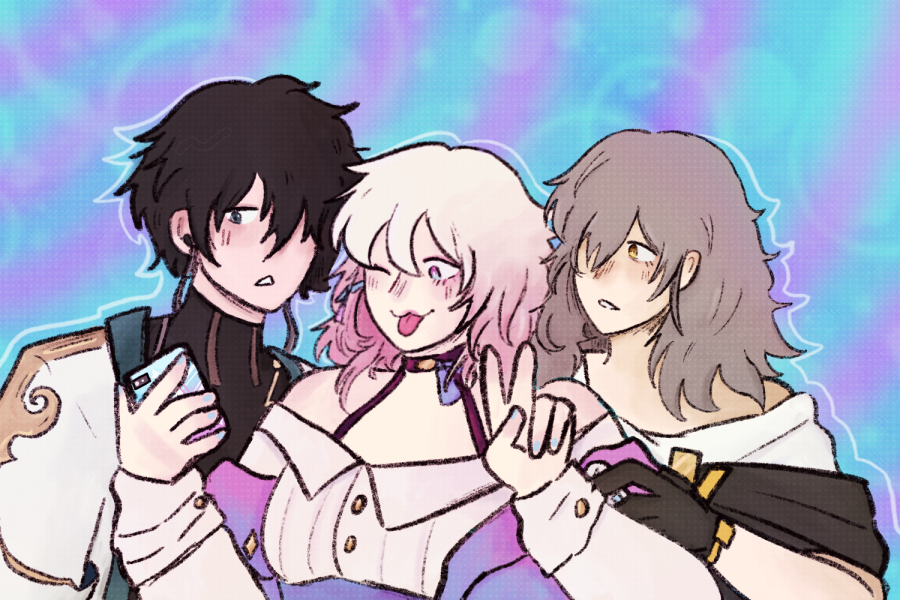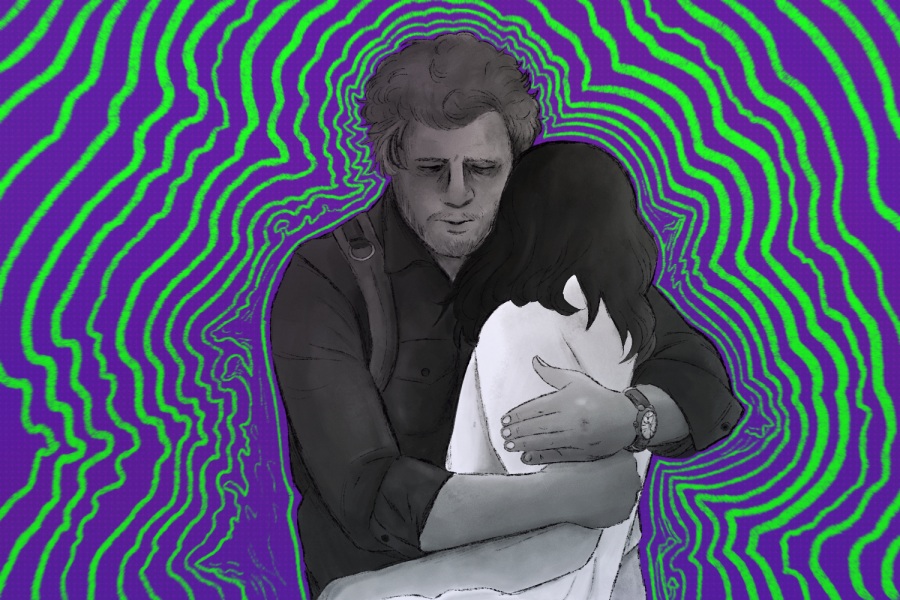
South Korean singer-songwriter IU has returned with her fifth studio album, “Lilac,” her first full album since the award-winning “Palette” in 2017. In a similar vein to the last album, IU reflects on her growth in her twenties, both as a celebrity and as an entertainer, while celebrating the turn of a new decade. Speaking on the concept of her album to W Korea, the singer said, “In the language of flowers, ‘lilac’ means ‘memories of youth,’ I wanted to include a farewell with the message ‘I’m now going onward to my next chapter’ while also greeting my upcoming thirties at the same time.”*
Throughout this album, IU conveys this relatable double message of farewell and greeting through tracks about the happiness and misery of short-lived love and the emotional maturity that comes with growing up. The album is musically and lyrically cohesive while still covering a wide range of sub-genres within her wheelhouse of indie-pop music.
The album begins with the eponymous title track, a groovy, city-pop number that celebrates a fleeting love through the metaphor of falling flowers. Her vocals are very reminiscent of other Korean indie artists, particularly Bolbbalgan4 (BOL4), with the light, nasally vocals that breathlessly exclaim, “Oh lilac, the day under the petals canopy good bye… How glorious it is!”** The retro instrumental perfectly complements the song’s joyful yet nostalgic message, setting the tone for the entire album about youth.
IU continues this playful tone in the rhythm-heavy second track, “Flu.” It is easily one of the most catchy tracks on the album, with the repeating intro and post-chorus of “Flu-hu-hu-hu, flu-hu-hu-hu-hu.” This could be considered a strength or a weakness; by the end of the track, the staccato harmonies became almost unbearable for me. In this song, IU discusses the downsides of young love that she alluded to in “Lilac,” comparing falling in love to catching the flu: “I can’t believe it / Oh, like a fool / I fall in love again / When I look at you, I get very embarrassed / It’s a virus that spreads all over my body/ I keep taking hot breaths until I collapse.”
The second title track, “Coin,” is a heavier, more sensual song along the lines of one of her other hits, “Twenty-Three.” In this song, the singer explores the album’s other topic of personal growth by describing the rewards of hard work and risk-taking. Similar to the other title track, the instrumental is a modern take on retro pop; the funky chorus and groovy beats are very reminiscent of Michael Jackson. Although it is not as strong lyrically, IU still showcases her musical range through controlled lower vocals and a rap-like second verse. It’s a bit of an outlier from the rest of the album but adds a great deal of variation from the rest of the pop- and ballad-heavy album.
“Hi spring Bye” is another retro ’80s track but from the ballad genre. Its roots are easily identifiable through the signature electric piano instrumental and slow-jam beat. Although it is quite slow, it doesn’t drag, with new layers of beats and instruments being added every measure. IU gets to showcase her specialty in ballads which launched her popularity in Korea: she switches effortlessly between soft whispers and high belting, all while conveying the emotional lyrics. The singer relives her memories with a past lover while also contemplating how they are doing in the present: “I guess this is a friendly goodbye / I won’t not know you / I’ll acknowledge you first, like this / Hi.”
The album transitions back to a dance track, bringing the listener’s mood back up while maintaining a nostalgic tone. “Celebrity” is my personal favorite, as a tropical house EDM song that rides just along the edge between peppy and bittersweet. Although it is reminiscent of other Western EDM hits that were particularly prevalent around 2017, the powerful message of the lyrics delivers the emotional impact those similar-sounding songs seem to lack. In the album introduction, IU says that she wrote the song with a friend in mind, who has a unique taste and strong opinions; although she loves them for all their characteristics, they also receive a lot of hate. While writing the lyrics, she realized that it was also partially her story, that anyone could relate to her “weird friend.” In the chorus, she reassures the song’s protagonist: “Don’t forget among the cloudy dark / You’re a star painted with a left hand / Can’t you see how beautiful/ A true uniqueness can be?/ You’re my celebrity.” That last line lingers right before the beat drop and is repeated over and over again in distorted vocals during the post-chorus, reassuring listeners of IU’s support regardless of their quirks or moods. This single dropped at the perfect time in late January as an uplifting anthem to tide me through the winter and into spring with the album’s release.
I was most looking forward to her collaboration with Dean, a popular Korean R&B singer-songwriter. His debut EP was one of the first albums to get me into Korean music; his smooth vocals and slightly jazzy compositions were perfect songs to relax to. This has been one of his first major releases since the EP release in 2016. IU is also known for her carefully-chosen collaborations for her albums: her previous songs with big-name artists such as BTS’s Suga, Big Bang’s G-Dragon, and Zion.T were all smash-hits.
Dean and IU’s collaboration “Troll” did not miss the mark. The song’s Korean title, “Dollimnorae,” literally “Revolving Song,” gives a better indication of the song’s lyrical content: the singers play as exes who constantly circle each other, falling back into bad habits despite ending the relationship. Despite the heavy lyrical content, the tone is very playful, with a lo-fi-inspired beat driving the instrumentals. The slight raspiness of Dean meshes well with IU’s sweetness, mingling to fill in the gaps between the beat and creating another grooving song to relax with. She follows this up with “Empty Cup,” another reflection on a soured relationship, with a more melancholy, R&B track composed by other famous K-R&B artists Woogie and Penomeco.
Another climactic ballad on the album comes in the form of the eighth track, “My sea.” IU takes this song to reflect on the dissociation she has felt from her growth, as she becomes unrecognizable and lost under the waves of the world. It is another classic Korean ballad by which she became famous; in fact, the composers who created her hit ballad “Through the Night” composed this song as well. It’s not my taste, as it is quite slow and songs like this tend to drag quite a bit, but it is definitely a fan-favorite. She continues this theme of the sea in the next track, “Ah puh” (an onomatopoeia for spitting water while swimming). She throws herself into the water she was so afraid of in “My sea,” relishing the freedom that threatened to overwhelm her in her youth. The bright and carefree song is just the lift needed to take the listener to the album’s finish line.
IU closes out the album with a letter to her fans in “Epilogue.” In another retro, lo-fi track, she asks fans, “Was it good to know me? / Was it good to love me?/ Are the old songs I would sing for us still comforting?/ If you answer ‘yes’ to all of these questions/ With that alone, my life will be okay.” She closes this chapter of her life, seeking reassurance that no matter what happens, she and her fans will eventually meet again.
Although IU has not made any radical changes to the pop genre, she excels at showcasing her artistic voice within the confines of the oversaturated industry. There are minor drawbacks from a few songs, but overall there are no fillers or skips in the album; it is sonically and lyrically cohesive while still exploring multiple themes and sub-genres to add variety. It is not only a perfect reflection for IU and her long-time fans to examine and reference the past decade of her extensive discography, but it also is the perfect introduction for new listeners to her style of indie-pop. It is a splendid snapshot of this turning point: of IU to a new decade, and of this dark winter into spring.
*Interview translations taken from Soompi
**Lyrics taken from the Genius English translations of the original lyrics in Korean





















